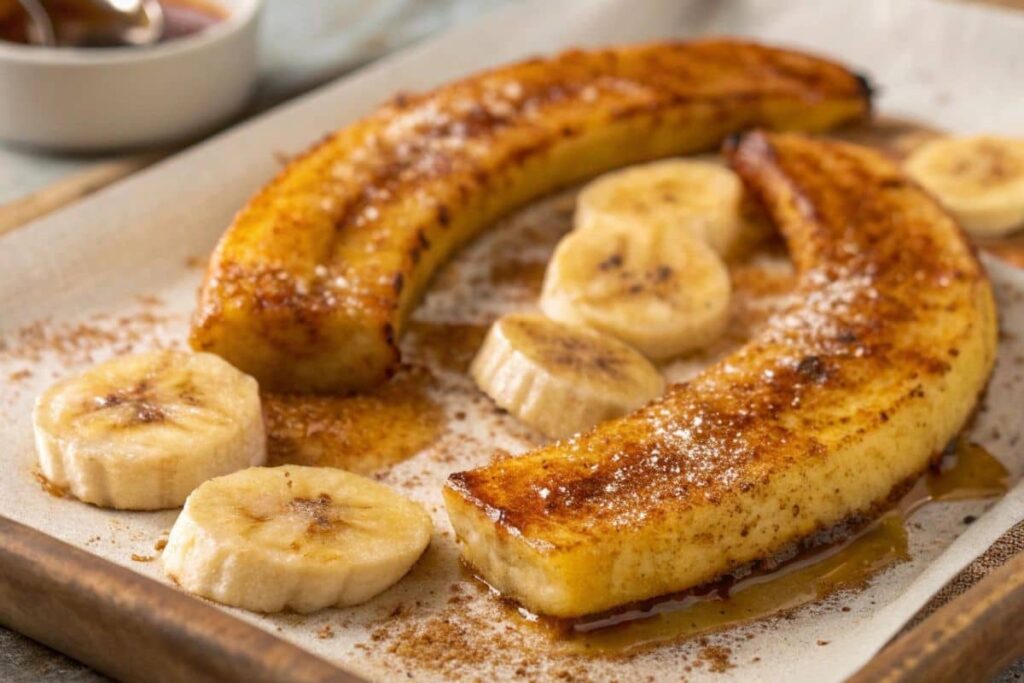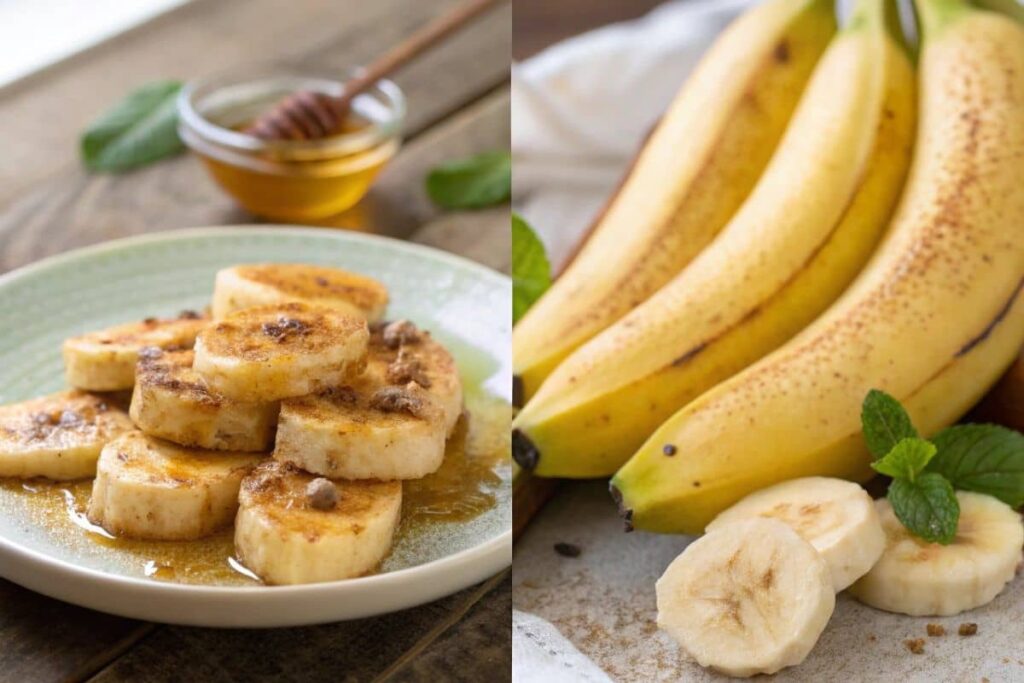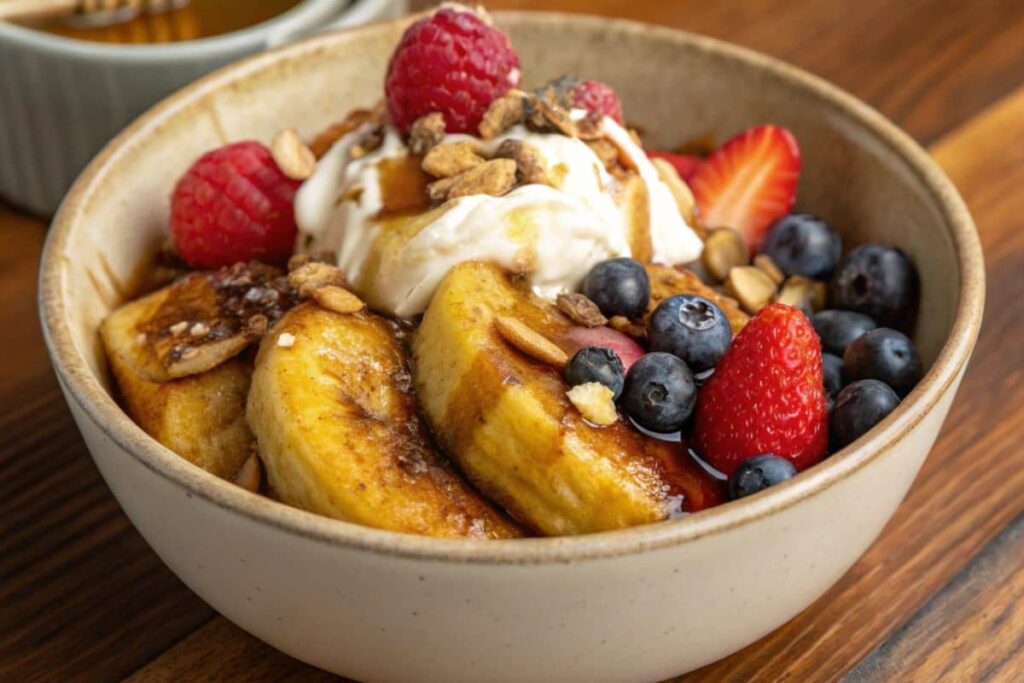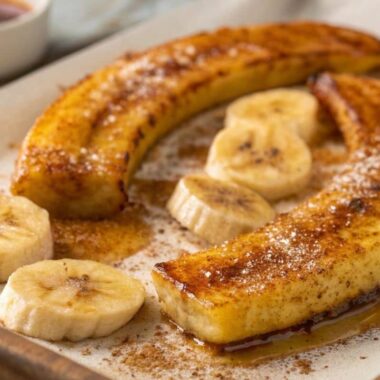Bananas deliver impressive nutritional benefits in their fresh state, but what happens to these valuable nutrients when exposed to baking temperatures? The relationship between heat and banana nutrition isn’t simply a story of loss—it’s a complex transformation worth understanding.
This examination reveals how baking affects the vitamins, minerals, and beneficial compounds in bananas, highlighting which nutrients remain intact and which undergo changes during the heating process. Discover the nutritional trade-offs when incorporating this versatile fruit into your favorite baked goods.
Table of Contents

Do bananas lose nutrients when baked?
Bananas are a favorite fruit for millions worldwide, celebrated not just for their natural sweetness but also for their incredible versatility and nutritional value. Whether enjoyed as a quick snack, blended into smoothies, or used as a star ingredient in desserts, bananas are a staple in many households. But what happens when you bake them? Does the heat from the oven strip away their nutrients, or do they maintain their health-boosting properties? This is a question that often comes up, especially among health-conscious individuals who love experimenting with bananas in recipes like baked desserts or healthy snacks.
Baking bananas doesn’t just change their flavor and texture; it also affects their nutritional profile in surprising ways. While some nutrients may slightly diminish, others remain intact, and some properties can even improve. If you’ve ever wondered how baking impacts the goodness of this beloved fruit—whether you’re making baby food, a banana pudding, or a simple baked treat—this article dives deep into the science and provides all the answers you need to make informed decisions in the kitchen. So, let’s peel back the layers and explore how baking bananas might alter their nutrient profile while still delivering delicious results.
Nutritional Profile of Bananas
Raw bananas are loaded with essential nutrients like potassium, vitamin C, vitamin B6, magnesium, and dietary fiber. They also contain natural sugars, antioxidants, and small amounts of protein and fat.
- Potassium: Supports heart health and muscle function.
- Vitamin C: Boosts immunity and acts as an antioxidant.
- Fiber: Promotes digestive health and helps control blood sugar levels.
- Vitamin B6: Essential for brain health and mood regulation.
These nutrients are why bananas are considered a powerhouse fruit. But does baking diminish their value?
What Happens to Nutrients During Baking?
Heat, in general, can affect the nutrient profile of foods. Baking bananas involves exposing them to temperatures around 350°F to 400°F (175°C to 200°C), which may lead to the breakdown of heat-sensitive nutrients like vitamin C. However, not all nutrients are equally vulnerable. Let’s dive deeper into the specifics.
- Vitamin C Loss: This water-soluble vitamin is particularly sensitive to heat and may degrade during the baking process.
- Potassium Stability: Potassium, a key mineral in bananas, is more heat-stable and remains largely intact when baked.
- Sugar Transformation: Baking can cause complex carbohydrates and resistant starch in bananas to break down into simpler sugars, making them sweeter and easier to digest.
Nutrients That May Decrease
- Vitamin C:
- Bananas contain modest amounts of vitamin C, but baking can cause some of it to degrade. Vitamin C is not heat-stable and begins to break down at temperatures as low as 158°F (70°C).
- While this might sound alarming, vitamin C isn’t the primary nutrient in bananas, so the loss is relatively minor.
- Potassium:
- While potassium is more heat-resistant, extreme or prolonged baking times might slightly reduce its concentration.
Nutrients That Remain Intact or Are Enhanced
- Resistant Starch to Sugars:
- Raw bananas contain resistant starch, which is harder to digest. Baking converts this starch into natural sugars, enhancing sweetness without adding extra calories.
- Dietary Fiber:
- Fiber content remains stable even after baking, making baked bananas an excellent option for maintaining gut health.
Baking and Sugar Content
Baking bananas intensifies their natural sweetness. This happens because heat breaks down starch into simple sugars like glucose and fructose. While this enhances flavor, it also slightly raises the glycemic index (GI) of bananas. This is worth noting for individuals managing blood sugar levels.
How Baking Changes Flavor and Texture
The baking process triggers the Maillard reaction—a chemical reaction between sugars and proteins—that gives baked bananas their caramelized flavor and rich aroma. The texture becomes softer, which is particularly appealing for use in puddings, smoothies, or as a topping for oatmeal.
Comparing Baked Bananas to Other Cooking Methods
When compared to frying or boiling, baking is one of the healthier ways to cook bananas.
- Raw vs. Baked: Raw bananas have slightly more vitamin C but are less sweet and harder to digest.
- Baked vs. Fried: Baking avoids the added fats from frying, making it the healthier option.

Tips to Preserve Nutrients When Baking Bananas
- Bake at Lower Temperatures: Baking at 300°F (150°C) can minimize nutrient loss.
- Shorten Baking Time: The less time your bananas are exposed to heat, the more nutrients they retain.
- Leave the Peel On: Baking bananas with their peel can protect nutrients from direct heat exposure.
Health Benefits of Baked Bananas
Baked bananas are not just a tasty treat; they’re also a nutritious option with several health benefits. The baking process enhances certain aspects of the banana’s nutritional profile, making them a smart choice for a variety of dietary needs. Let’s delve deeper into the health advantages of baked bananas.
1. Easier Digestion
One of the most significant benefits of baked bananas is their ease on the digestive system. Bananas naturally contain resistant starch, which can be harder for some people to digest in its raw form. However, when bananas are baked, the heat breaks down these resistant starches into simpler sugars like glucose and fructose.
This transformation not only makes the bananas sweeter but also gentler on the stomach, making baked bananas an ideal option for:
- People with sensitive stomachs.
- Children or the elderly who might prefer softer, easier-to-digest foods.
- Those recovering from illness and seeking bland but nutritious options.
Additionally, baked bananas can help soothe the digestive tract, especially when consumed warm. They’re often recommended for individuals experiencing acid reflux or mild gastrointestinal discomfort.
2. Natural Sweetness
Baked bananas are nature’s answer to sugar cravings. When heated, the natural sugars in bananas caramelize, creating a rich, sweet flavor without the need for added sugar. This makes them a healthy substitute for sugary snacks or desserts.
Why it matters:
- Reduced sugar intake is linked to better weight management, improved energy levels, and a lower risk of diabetes.
- Using baked bananas in recipes like banana bread or muffins can significantly reduce the need for added sweeteners, keeping the dish healthier overall.
Whether you’re topping oatmeal, yogurt, or pancakes with baked bananas, they offer a guilt-free way to satisfy your sweet tooth.
3. Nutrient Retention
While the baking process may slightly reduce the levels of vitamin C, baked bananas retain most of their essential nutrients, making them a valuable addition to a balanced diet.
Key nutrients preserved:
- Potassium: A crucial mineral for maintaining heart health, regulating blood pressure, and supporting muscle function.
- Fiber: Helps promote digestive health, regulate blood sugar levels, and keep you feeling full longer.
- Vitamin B6: Supports brain health and energy metabolism.
- Antioxidants: Even after baking, bananas provide compounds that combat oxidative stress and inflammation in the body.
Furthermore, the baking process concentrates these nutrients, especially potassium and fiber, as the water content of the banana reduces. This makes baked bananas a nutrient-dense option for individuals looking to maximize the health benefits of their meals.
4. Boosted Energy Levels
Baked bananas are an excellent source of natural carbohydrates, providing quick and sustained energy. The conversion of resistant starch into simple sugars during baking makes them particularly useful for:
- Athletes needing a pre- or post-workout snack.
- Busy individuals looking for a quick energy boost during the day.
Pairing baked bananas with a source of protein, such as yogurt or nuts, creates a well-rounded snack that supports sustained energy and satiety.
5. Improved Mood and Stress Relief
Bananas, including baked ones, contain tryptophan, an amino acid that the body converts into serotonin—a neurotransmitter associated with mood regulation and relaxation. Alongside magnesium and vitamin B6, baked bananas can:
- Help reduce stress.
- Support better sleep quality.
- Provide a comforting, warm treat that enhances mental well-being.
Recipes That Use Baked Bananas
Baked bananas are a versatile ingredient that can elevate simple recipes into delightful treats. Whether you’re looking for a quick snack, a healthy dessert, or an indulgent breakfast option, baked bananas fit the bill. Here are two detailed recipes to inspire your next baking session.
1. Simple Baked Banana Recipe
This easy recipe is perfect for when you’re craving a warm, sweet treat without spending too much time in the kitchen.
Ingredients:
- 2 ripe bananas (firm but slightly spotted for sweetness)
- 1 teaspoon ground cinnamon
- 1 teaspoon honey or maple syrup (optional for added sweetness)
- A pinch of nutmeg (optional)
- 1 teaspoon melted coconut oil or butter (optional for a richer flavor)
Instructions:
- Preheat the Oven: Set your oven to 350°F (175°C) and line a baking sheet with parchment paper to prevent sticking.
- Prepare the Bananas: Peel the bananas and slice them lengthwise into halves. Arrange the banana slices on the prepared baking sheet, flat side up.
- Add Flavorings: Lightly brush the banana halves with melted coconut oil or butter if desired. Sprinkle ground cinnamon evenly over the bananas. For extra flavor, add a pinch of nutmeg or drizzle with honey or maple syrup.
- Bake: Place the baking sheet in the oven and bake for 12–15 minutes, or until the bananas are golden and slightly caramelized.
- Serve Warm: Enjoy the baked bananas on their own, or serve with a scoop of ice cream, a dollop of whipped cream, or a drizzle of chocolate sauce for a dessert twist.
Pro Tip: For a crunchier texture, sprinkle crushed nuts, like pecans or walnuts, over the bananas before baking.
2. Banana Dessert Bowl
Transform baked bananas into a wholesome, indulgent dessert bowl that’s packed with nutrients and flavors.
Ingredients:
- 2 medium bananas
- ½ cup Greek yogurt or plant-based yogurt
- 2 tablespoons honey or maple syrup
- 2 tablespoons chopped nuts (e.g., almonds, walnuts, or pecans)
- 1 tablespoon chia seeds or flaxseeds (optional for extra fiber)
- 1 teaspoon cinnamon
- Fresh fruit like berries or sliced kiwi (optional)
Instructions:
- Bake the Bananas: Follow the steps from the Simple Baked Banana Recipe above to prepare and bake the bananas. Let them cool slightly after baking.
- Assemble the Bowl: Place the baked bananas in a shallow bowl. Add a generous scoop of Greek yogurt or your favorite plant-based yogurt beside or on top of the bananas.
- Add Sweetener and Spices: Drizzle honey or maple syrup over the yogurt and bananas. Sprinkle ground cinnamon evenly for added warmth and flavor.
- Top with Crunch: Sprinkle chopped nuts and chia seeds or flaxseeds over the entire bowl. This adds texture and boosts the nutrient profile.
- Garnish with Fresh Fruit: For extra color and freshness, add a handful of berries or slices of kiwi on top.
- Serve and Enjoy: Serve immediately as a dessert or a healthy breakfast option.
Pro Tip: Swap the yogurt for ice cream or frozen yogurt if you’re serving this as a dessert for guests. The combination of warm bananas and cold ice cream is irresistible!

Baking Bananas: A Delicious and Nutritious Choice
Baking bananas is not just a delightful way to enhance their natural sweetness and flavor; it’s also a convenient method to use overripe bananas or create a healthier dessert option. While it’s true that baking may result in minor nutrient loss, particularly of vitamin C due to its sensitivity to heat, the overall nutrient profile of bananas remains robust. Essential nutrients like potassium, dietary fiber, and vitamin B6 are retained, ensuring that baked bananas continue to support heart health, digestion, and energy production.
Transforming Starches into Natural Sugars
One of the most significant advantages of baking bananas is how it transforms their starches into natural sugars. This process makes them easier to digest and a perfect alternative to sugar-laden desserts. Baking softens their texture, caramelizes their sugars, and amplifies their flavor, creating a satisfying treat that feels indulgent without the guilt.
Whether you bake them plain, with a sprinkle of cinnamon, or as part of a larger recipe like banana bread or muffins, baked bananas are versatile and can be tailored to suit any dietary need, including vegan, gluten-free, and low-fat diets.
A Smart Option for Weight Management
Baked bananas can also be an excellent option for those looking to lose weight or manage their sugar intake. Their natural sweetness means there’s no need for added sugar, and they make for a filling and nutritious snack.
Plus, you can preserve even more of their nutrient content by leaving the peel on during baking or keeping the temperature moderate. This ensures that baked bananas remain a low-calorie, nutrient-rich food that fits into almost any meal plan.
The Perfect Combination of Taste and Nutrition
In conclusion, baking bananas offers the best of both worlds—nutritional benefits and culinary enjoyment. Whether you’re a fan of simple baked banana recipes or prefer incorporating them into more elaborate dishes, this humble fruit adapts beautifully to the oven.
So, don’t hesitate to experiment with baked bananas in your kitchen—they’re a tasty, nutritious addition to any meal or dessert lineup. Enjoy their goodness while reaping the health benefits, one bite at a time.
FAQs
Do baked bananas still provide potassium?
Yes, potassium is heat-stable and remains largely intact during baking. If you’re looking for a potassium-rich baked treat, try this 4-Ingredient Banana Bread Recipe: Quick, Easy, and Delicious for a simple and wholesome option.
Are baked bananas good for digestion?
Absolutely. Baking converts resistant starches into simple sugars, making them easier to digest. This makes baked bananas an excellent choice for those seeking a light and easily digestible snack or dessert. Curious about carb content? Check out Which Has More Carbs: Bread or Banana? for a closer look at banana nutrition.
Does baking bananas increase their sugar content?
Baking doesn’t add sugar but breaks down starches into natural sugars, enhancing sweetness. This makes baked bananas a naturally sweet option that works beautifully in recipes like banana muffins. Want tips for baking perfect muffins? Discover What Is the Secret to Moist Muffins?.
Can I bake bananas with the peel on?
Yes, baking bananas with their peel can help retain more nutrients. The peel acts as a protective barrier, preventing direct exposure to heat, which can preserve nutrient content.
Are baked bananas suitable for weight loss?
Yes, they are naturally sweet and low in fat, making them a healthy treat for weight-conscious individuals. Pairing baked bananas with low-calorie recipes, like a simple baked banana with cinnamon, can satisfy cravings without excess calories.

Simple Baked Banana
Ingredients
For the baked bananas
- 2 ripe bananas 2 ripe bananas (firm but slightly spotted for sweetness)
- 1 teaspoon 1 teaspoon ground cinnamon
- 1 teaspoon 1 teaspoon honey or maple syrup (optional for added sweetness) Optional
- 1 pinch A pinch of nutmeg (optional) Optional
- 1 teaspoon 1 teaspoon melted coconut oil or butter (optional for a richer flavor) Optional
Instructions
Preparation
- Preheat the Oven: Set your oven to 350°F (175°C) and line a baking sheet with parchment paper to prevent sticking.
- Prepare the Bananas: Peel the bananas and slice them lengthwise into halves. Arrange the banana slices on the prepared baking sheet, flat side up.
- Add Flavorings: Lightly brush the banana halves with melted coconut oil or butter if desired. Sprinkle ground cinnamon evenly over the bananas. For extra flavor, add a pinch of nutmeg or drizzle with honey or maple syrup.
Baking
- Bake: Place the baking sheet in the oven and bake for 12–15 minutes, or until the bananas are golden and slightly caramelized.
- Serve Warm: Enjoy the baked bananas on their own, or serve with a scoop of ice cream, a dollop of whipped cream, or a drizzle of chocolate sauce for a dessert twist.
